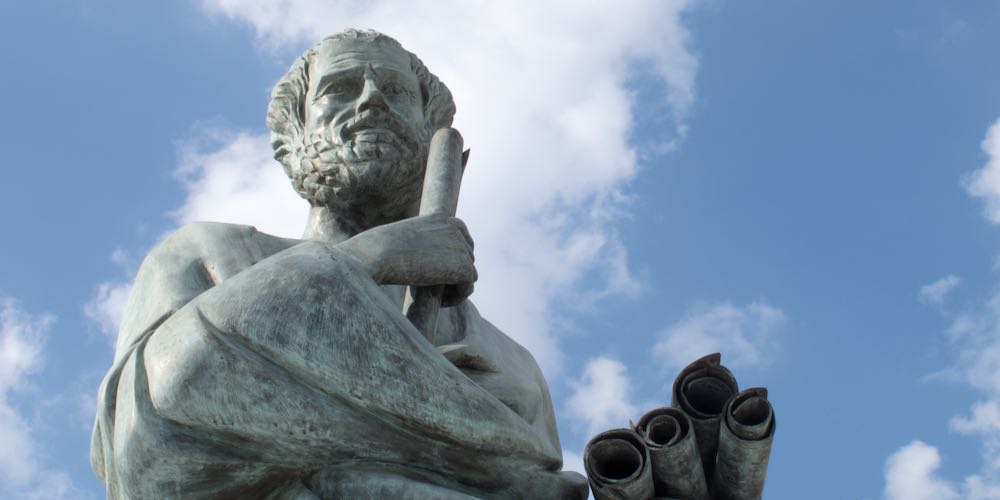Instead of a story about heroism, Dune: Part Two is a sociological picture of a liberal, progressive America.
A Neo-Aristotelian Basis for Liberty and Virtue
My hat is off to Daniel Klein and Daniel J. Mahoney, who recently wrote a fine essay for this site, correctly warning both classical liberals and conservatives to avoid the error of throwing the baby out with the bath water. There are indeed insights from classical liberal and conservative political traditions that are mutually supporting. These need to be employed to avoid the threatening nihilist and authoritarian abyss.
However, one need not assume that these sources of mutual support only come from those Klein and Mahoney discuss—that is, from either a religious ethics or Smithean moral sentiment theory. These alternatives are not jointly exhaustive. There are other sources that are neither religious nor Smithean.
I will only briefly discuss one here—namely, a neo-Aristotelian approach that recognizes that it is the natures of individual human beings that provide the ultimate sense of “law” (that is, a standard or measure) for determining not only what is good and right for human beings but also what the aim of the political/legal order should be. In other words, it is possible to link a theory of natural moral law with a political theory of basic, negative, natural rights—that is, the individual rights to life, liberty, and property.
Douglas J. Den Uyl and I have argued in our works (including Norms of Liberty; The Perfectionist Turn; and The Realist Turn) for a perfectionist account of natural moral law that recognizes both (a) that individual human beings are not mere loci in which good and virtue are instantiated but are rather unique beings with specific identities that are determinative in part of what is good and virtuous, and (b) that human sociality is critical to this determination. Accordingly, both the importance of individuality and sociality to attaining human good are emphasized. The starting point of the moral life is tradition—what Aristotle called the “endoxa” (established opinion)—and the completion point is the exercise of practical wisdom (phrónēsis). Practical wisdom is the primary virtue for self-perfection, because it is concerned with making what is good and virtuous abstractly considered into something real and determinate—that is, something concrete and particular. Hence, this approach does not reject the vital role of tradition, and it does not conceive of moral obligation as either impersonal or solely rationalistic. Human good is individualized, self-directed, social, and objective. There is then no commitment to subjectivism, expressivism, or any form of ethical noncognitivism. Moreover, the moral life is robust with no reduction to the moral minimalism sometimes found in the thought of those who advocate classical liberalism.
A key, if not the key, for understanding how classical liberal and conservative thought can be mutually supportive is to be found in the link between natural moral law and basic negative natural rights of life, liberty, and property.
This robust account reveals the need for ethical principles that will reconcile the individualistic and social character of human good, laying a foundation for a political/legal order that will not require as a matter of principle that different forms of human good be sacrificed one to another. Since human good as a cognitive-independent reality is neither abstract nor universal, but is always particular and concrete, and since self-direction is the fundamentally essential feature of human good (for it is necessary for the very exercise of practical wisdom), it is the protection of its possibility that becomes the paramount ethical concern of the political/legal order. This is so not only because self-direction is necessary for the very possibility of moral responsibility (and thus human good) but also because it is the only feature of human good the protection of which is compatible with the plurality of forms of human good. This is to say that there is an ethical basis for a system of positive law whose foundational principles are individual rights that have the primary function of protecting the possibility of self-direction.
These principles reconcile both the individuality and sociality of human good. They are also the political/legal expression of the common good of society that in turn provides the legal backdrop for the possibility of more specific and various forms of the pursuit of common goods. (See Michael Oakeshott’s discussion of civil and enterprise associations in On Human Conduct.) Here the protection of freedom of association is essential. Finally, they provide a basis for patriotism.
A key, then, if not the key, for understanding how classical liberal and conservative thought can be mutually supportive is to be found in the link between natural moral law and basic negative natural rights of life, liberty, and property. Nonetheless, to appreciate how there can be neo-Aristotelian support for classical liberalism of the kind just outlined, four further insights need to be grasped.
1. Liberalism is not a comprehensive world view complete with its own view of human nature, human good, and human reason. Rather, it is a political philosophy that holds that liberty is the paramount concern for the political/legal order.
2. As such, liberty is the highest political end, as Lord Acton notes. It is not, however, the highest ethical end. Therefore, contrary to what some classical liberals hold, there needs to be a connection between liberalism and the moral order. Liberty is not an amoral notion, but is instead defined by basic, negative, natural rights, and these rights are crucial to the possibility of a robust ethical life among others.
3. Liberalism as such requires a philosophical grounding, but one falls into error if one thinks that liberalism can provide its own deep structure—say, an account of human nature, human good, and human reason. This weakness many conservative thinkers have noted, and this error is typified in the constructivist efforts of John Rawls and the many who have followed his lead in regard to contemporary liberalism. (See my essay with Den Uyl, “Did Rawls Restore Political Philosophy?”)
4. Contrary to what most of its critics and indeed some defenders contend, liberalism has the capacity to move beyond common modern sources of support, such as Locke, Kant, and Mill. It is this capacity that opens the door to neo-Aristotelian foundations.
So, a neo-Aristotelian approach to liberalism of the kind portrayed here can provide a basis for mutual support for classical liberal and conservative political traditions. But there are two things that remain to be considered.
One cannot simply assume that what the virtue of justice requires must be the same as what a just legal order requires.
The first is that statecraft is not soulcraft. Knowing that X-ing is good and right and ought to be done (or that X-ing is bad and wrong and ought not to be done) is not sufficient to show that X-ing ought to be a concern for the positive law. This is a non sequitur. A “middle term” is needed, and it is individual rights. In other words, the abiding and overarching concern of positive law is to protect individual rights, since they are, as argued above, what is required to protect the possibility of self-direction. So, contrary to what Aristotle seems to have thought, the purpose of positive law is not to make men moral or even attempt to fashion just social relations.
To appreciate this point, it is necessary to note briefly that there is a difference between demands of justice that are morally binding and demands of justice that are morally and legally binding. One cannot simply assume that what the virtue of justice requires must be the same as what a just legal order requires. Liberty as defined by basic, negative natural rights remains the paramount concern of legal justice even though the main concern of the ethical life is one of individual self-perfection, which includes the virtue of justice. But the virtue of justice is not the same as legal justice, because the former is concerned with giving others their due and involves consideration of their character, conduct, and circumstances. It requires employing the virtue of practical wisdom for its application. It is neither blind nor impersonal. What it concretely requires can vary from person to person. The latter attempts to treat everyone in an impersonal manner. There can be questions regarding what a law involves in a certain context, requiring practical judgment, but the chief concern is with legal compliance, not the employment of practical wisdom in determining what the virtue of justice requires for a given individual in specific circumstances.
There needs to be some connection between the ethical order and the political/legal order if the political/legal order is to have legitimacy, but their ethical aims are different, and these must not be conflated. The primary significance of the classical liberal political tradition is that it has generally recognized the ethical importance of this difference. (See F. A. Hayek’s “Why I am Not a Conservative.”)
The second is that natural moral law is not divine command theory. As noted, it is the natures of individual human beings that ground ethics. This is, of course, not to deny the existence of God. Nor is it to deny that religion, properly understood, notes vital things about human beings that would be foolish to ignore. Further, this is not to deny that religion is an important part of public life and deserves legal protection. People should be at liberty to promote their religious views and use them to influence peacefully social and political life. (To note once again, protection of freedom of association is crucial.) But as sketched here, natural moral law is a moral theory that is based on human nature and a teleological conception of living things. It is not as such a religious ethics—at least as normally understood—nor is it a moral sentiment theory.
There are myriad issues and details involved in the above observations that I cannot examine here, and I want to emphasize that these observations are not meant to deny the importance either of a religious ethics or of Smith’s moral sentiment theory. Rather, I just wanted to note an alternative way of understanding how classical liberal and conservative thought can be mutually supportive.



